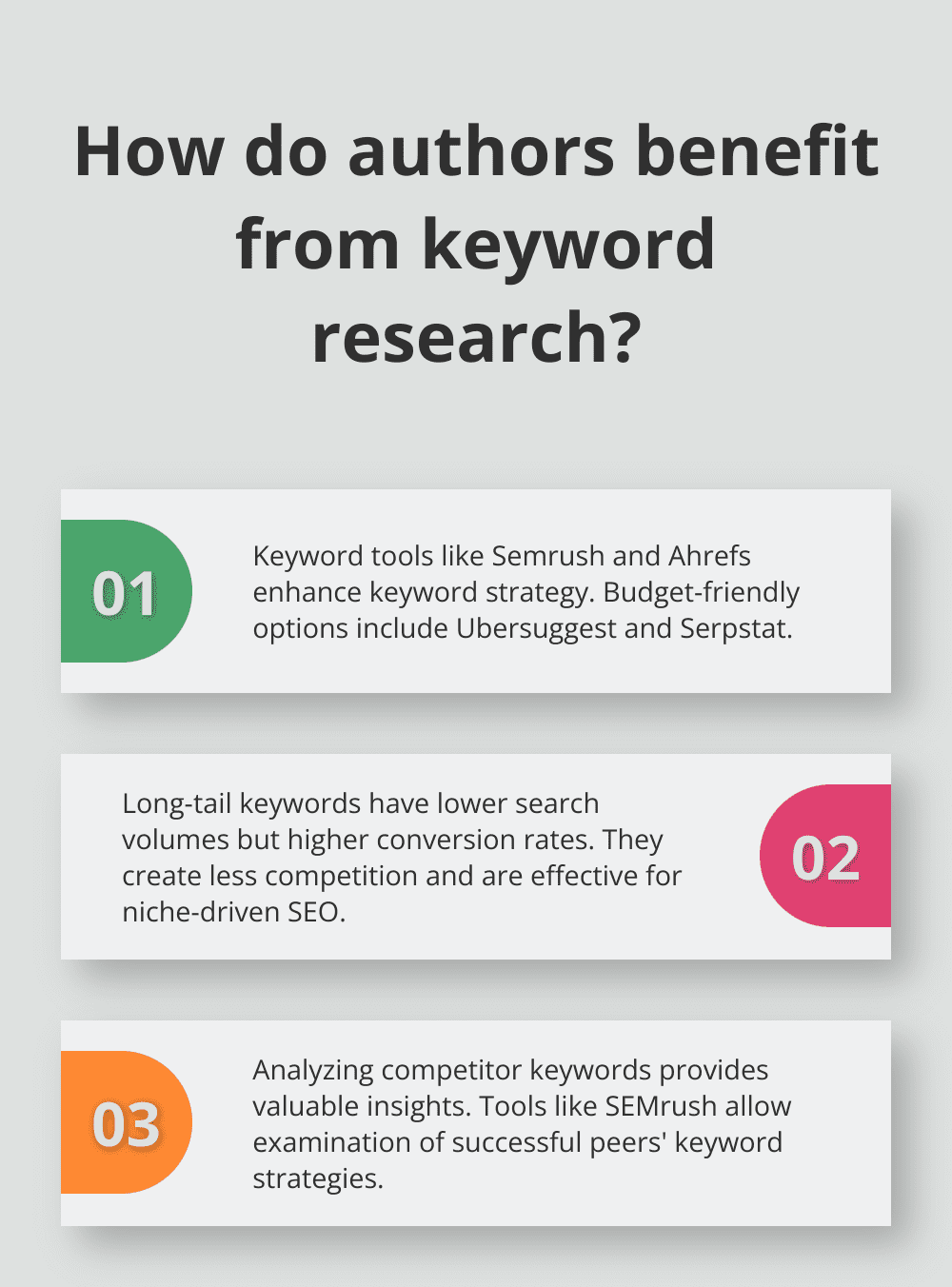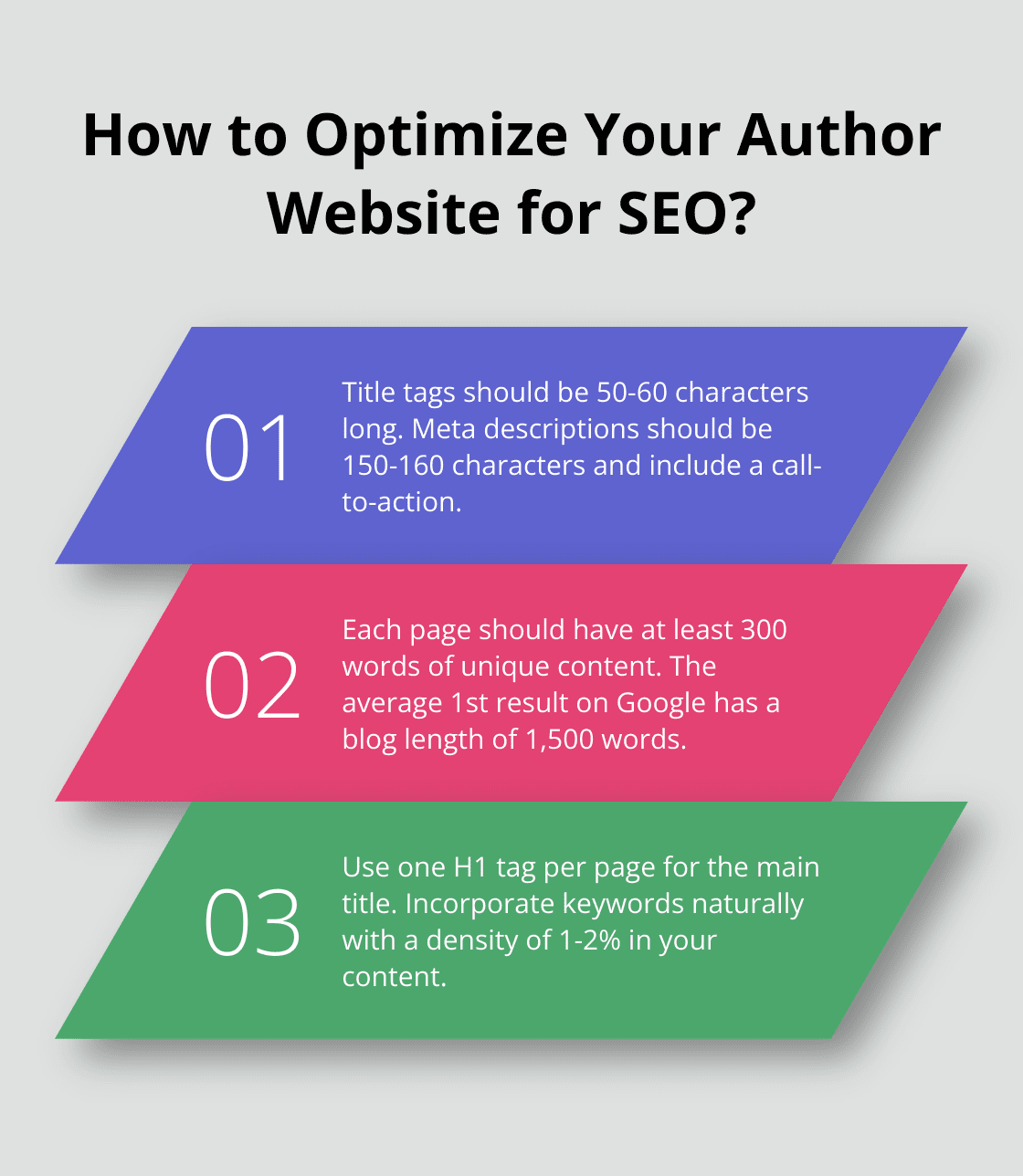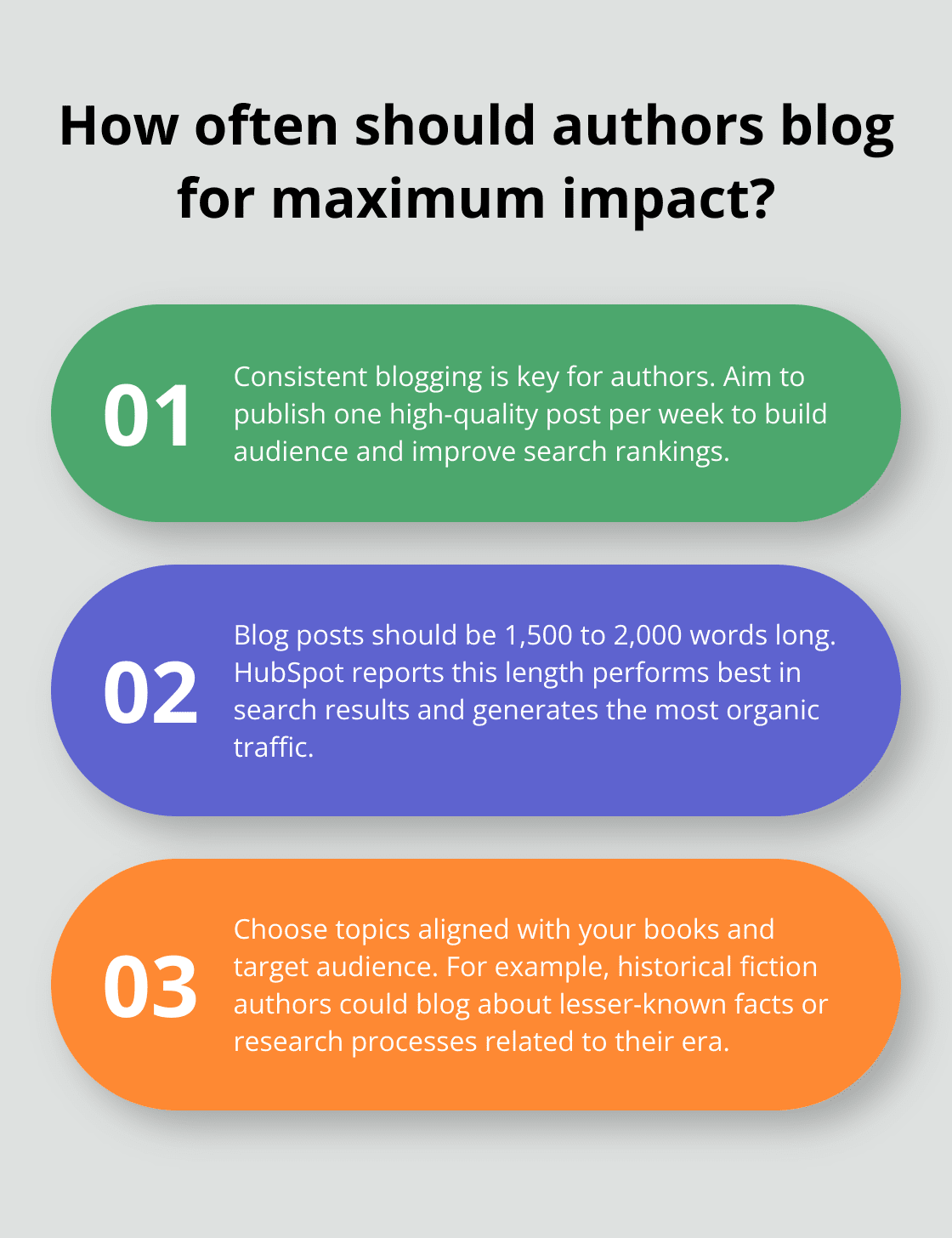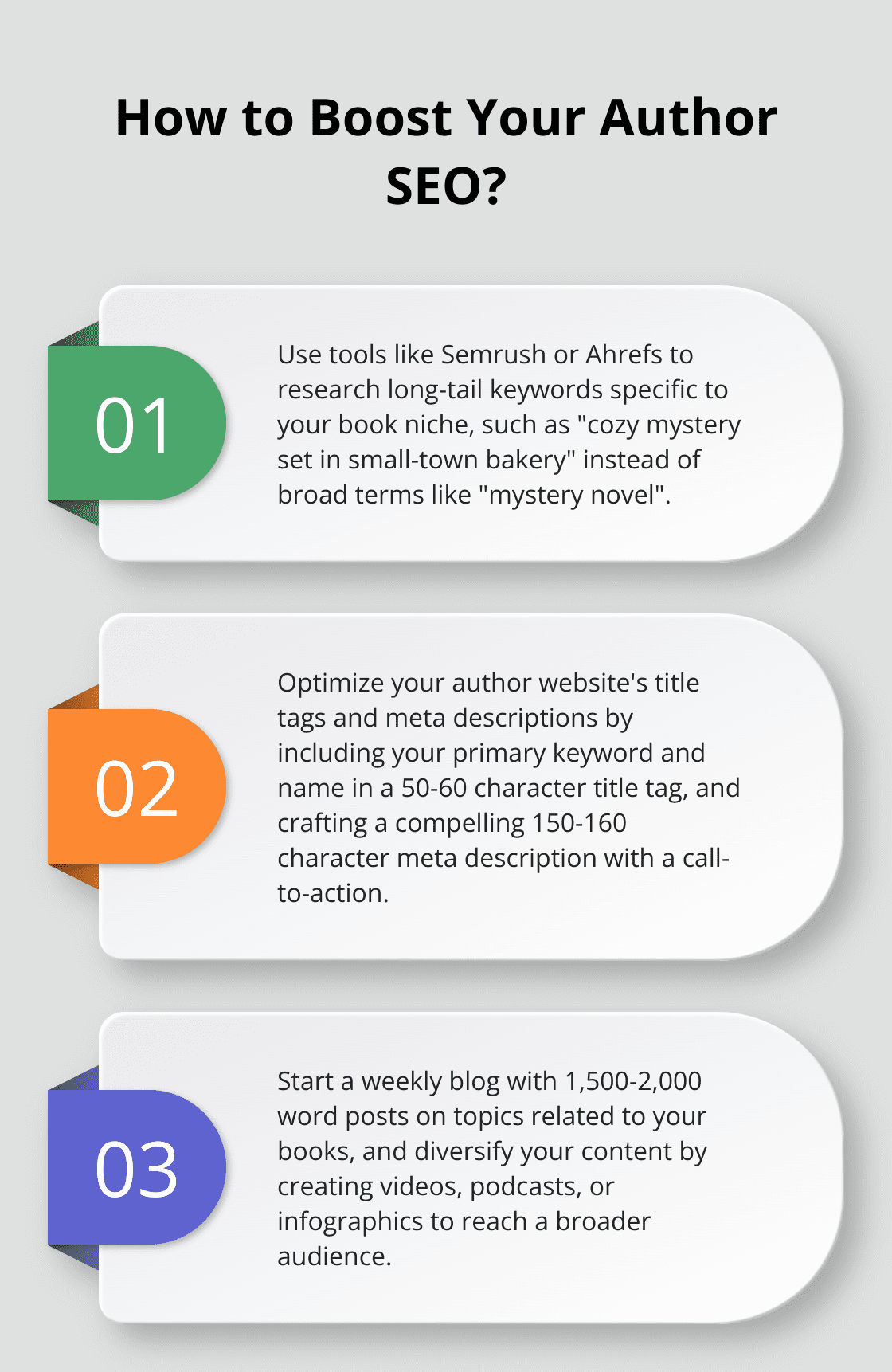At Beverly Hills Publishing, we know that author visibility is key to success in the digital age. SEO optimization can significantly boost an author’s online presence and book sales.
This blog post offers practical author SEO optimization tips to help writers stand out in search results. We’ll cover essential strategies from keyword research to content marketing, giving you the tools to improve your online reach.
How to Master Keyword Research for Authors
Leveraging Powerful Keyword Tools
Powerful keyword tools like Semrush and Ahrefs can significantly upgrade your keyword strategy. For authors on a budget, options like Ubersuggest and Serpstat offer valuable insights without breaking the bank. These platforms can help you uncover search volumes, competition levels, and related terms that are crucial for optimizing your online presence.
The Power of Long-Tail Keywords
Long-tail keywords are specific phrases that typically have lower search volumes but higher conversion rates. For authors, these can be valuable assets. Niche-driven SEO creates less competition through lower keyword difficulty and lower search volume, making it an effective strategy for authors. Instead of targeting broad terms like “mystery novel,” try to focus on more specific phrases such as “cozy mystery set in small-town bakery.” This approach helps you stand out in a less competitive space and attracts readers who are more likely to be interested in your specific niche.
Analyzing Competitor Keywords
Studying the keywords your successful peers use can provide valuable insights. Tools like SEMrush allow you to examine your competitors’ keyword strategies. For example, if you write science fiction, you might discover that successful authors in your genre target keywords like “dystopian young adult series” or “space opera with strong female lead” (both potentially lucrative niches). This information can help you refine your own keyword strategy and potentially uncover untapped opportunities.
Staying Current with Search Trends
Search trends evolve, and reader interests shift. Regular updates to your keyword strategy are essential for maintaining and improving your online visibility. Set a reminder to review and adjust your keywords quarterly (or more frequently if you’re in a fast-moving genre). This practice ensures that your author platform remains relevant and continues to connect with readers who actively search for books like yours.

As you move forward with your keyword research, it’s important to consider how these keywords will integrate into your author website. The next section will explore on-page SEO techniques that will help you make the most of your carefully chosen keywords.
Crafting SEO-Friendly Author Websites
Optimize Title Tags and Meta Descriptions
Your title tags and meta descriptions create the first impression in search results. For title tags, try to keep them between 50-60 characters, including your primary keyword and author name. For example, “Thrilling Mystery Novels | Jane Doe Author” effectively communicates both genre and authorship.

Meta descriptions should provide compelling 150-160 character summaries of your page content. Include a call-to-action like “Discover Jane Doe’s latest mystery novel” to encourage clicks. Pages with meta descriptions get more clicks than those without, according to recent studies.
Create Unique and Engaging Content
Each page on your author website should serve a distinct purpose. Your homepage might spotlight your latest release, while individual book pages should focus on plot summaries and reviews. Blog posts can explore your writing process or discuss themes from your books.
Try to include at least 300 words of unique content per page. This provides search engines with enough information to understand and rank your content effectively. The average 1st result on Google has a blog length of 1,500 words, so don’t hesitate to provide in-depth content where appropriate.
Use Header Tags Effectively
Header tags (H1, H2, H3) help organize your content and signal its structure to search engines. Use only one H1 tag per page, typically for your main title. H2 tags work well for main sections, while H3 tags can break these down further.
For example, on a book page:
H1: “The Midnight Conspiracy: A Jane Doe Mystery”
H2: “Book Synopsis”
H2: “Critical Acclaim”
H3: “New York Times Review”
H3: “Reader Testimonials”
This structure improves scannability for readers and helps search engines understand the hierarchy of information on your page.
Incorporate Keywords Naturally
While keywords play a vital role, their use should feel organic. Try to include your primary keyword in the first 100 words of your content, but avoid keyword stuffing. A keyword density of 1-2% is generally considered optimal.
Use variations of your keywords to avoid repetition. If your primary keyword is “mystery author,” you might also use phrases like “crime fiction writer” or “detective novel creator” throughout your content.
Search engines have become increasingly sophisticated in understanding context. Focus on creating valuable, relevant content for your readers, and the keywords will naturally fall into place.
These on-page SEO techniques will improve your author website’s search engine performance. However, website optimization represents just one piece of the puzzle. The next section will explore how content marketing can further enhance your author brand and establish your authority online.
How Authors Can Build Authority Through Content
Start a Powerful Blog
A blog serves as your digital home base. Try to publish one high-quality post per week. This consistency will help build your audience and improve search engine rankings.

Choose topics that align with your books and target audience. For instance, if you write historical fiction set in Tudor England, your blog could feature posts about lesser-known historical facts, your research process, or discussions about the era’s impact on modern society.
To maximize SEO benefits, write posts between 1,500 to 2,000 words. HubSpot reports that articles of this length tend to perform best in search results and generate the most organic traffic.
Create Diverse Content Types
While blogging is essential, diversifying your content types can help you reach a broader audience and cater to different learning styles. Consider creating:
- Videos: Short author vlogs or book trailers can engage viewers effectively.
- Podcasts: This medium offers a unique way to connect with your audience. You could start a podcast about writing tips, interview fellow authors, or explore themes from your books.
- Infographics: These visual representations of data or concepts can be highly shareable on social media. Tools like Canva allow you to create professional-looking infographics without design experience.
Write Guest Posts to Expand Your Reach
Writing guest posts for relevant websites and blogs in your genre or industry can significantly expand your reach and build valuable backlinks to your site. Identify popular blogs in your niche and pitch unique, valuable content ideas.
Always include a brief author bio with a link back to your website when guest posting. This drives traffic and improves your site’s SEO.
Engage Authentically on Social Media
Social media platforms offer direct lines of communication with your readers. Select 2-3 platforms where your target audience is most active and focus on consistent, authentic engagement.
Share glimpses of your writing process, respond to reader comments, and participate in relevant conversations.
Building authority through content requires consistent effort and patience, but the rewards (increased visibility, stronger reader relationships, and improved book sales) make it a worthwhile investment. For more in-depth strategies on content marketing for authors, check out our comprehensive guide.
Final Thoughts
Author SEO optimization tips provide a strategic approach to boost online visibility and success. These techniques include mastering keyword research, optimizing websites, and building authority through content marketing. Authors who apply these strategies consistently will see gradual improvements in search engine rankings, website traffic, and book sales.

We at Beverly Hills Publishing understand the challenges authors face in the digital landscape. Our innovative approach combines publishing with strategic branding and marketing to help authors establish themselves as industry leaders. We propel authors beyond traditional publishing boundaries and help them build a strong media presence.
Beverly Hills Publishing supports authors in maximizing their online presence and taking their careers to new heights. Authors who implement these SEO strategies and leverage our expertise will enhance their visibility and build a strong brand identity. Your words deserve to be discovered, and with the right SEO approach, they will reach a wider audience.















































































































































































































































